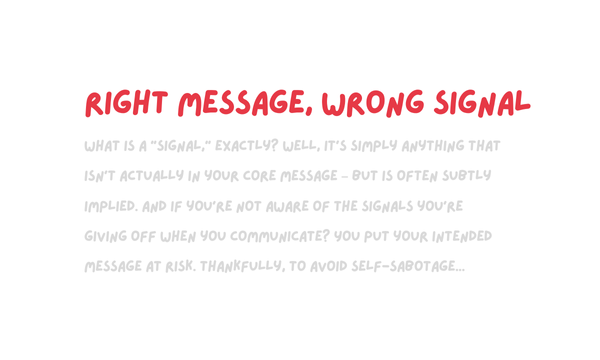The Surprising Lessons from Writing Everyday for a Week
I love writing. But I hate the process of it. For most of my life, writing has been an all-or-nothing endeavor: you either lock yourself up in a room, crank up the white noise, pour hours into writing and revising— or you don’t write at all.

I’m a little bit more on time than this guy, at least.
For many years that modus operandi worked. Every writing session was a battle, but I could usually count on myself coming out of the other side victorious and with something to be proud of.
But this also meant I picked very few battles. If I didn’t think that I had the right time and space, and if I didn’t believe I had worthy material — I simply wouldn’t write.
Then this year, I challenged myself to experiment with writing something everyday.
Here are the three lessons I’ve learned already, after the first week.
#1 The pursuit of perfection is fine. But the pursuit of less imperfection is OK too.
I realized very quickly that in order to write everyday (on top of a day job) meant two things: exercising discipline and making trade-offs.
At first glance, discipline is straightforward: you simply need to carve out the time and the energy to think and write.
But discipline goes deeper than just the act of writing. What’s more critical is the discipline of not letting perfection get in the way of progress. This means telling myself that I have to be OK with whatever I wrote, once the clock strikes midnight everyday (literally).
No more burning of the midnight oil in pursuit of the perfect prose. And no more insistence on five rounds of revisions before something goes live.
Even only after a week, this has been one of the toughest lessons for me. Previously I treated every writing session as a battle, which meant that there was no room for imperfection. If I went into battle, then I had better come out the other side with a polished epic in hand.
As a result, each battle was costly in terms of my time and mental energy. But I thought that was just the way it was; at least I would have the perfect set of words at the end. All these years, I’ve been accustomed to these somewhat sadistic routines, where I would inevitably scrap half the stuff I wrote, rewrite the existing half, and slowly iterate my way towards perfection.
But now I’m learning how to take on little skirmishes instead.
I’m learning that while the pursuit of perfection in writing is noble, there’s nothing wrong with learning how to write a little less imperfectly each day, and learning to be comfortable with constraints. After all, you don’t have all the time in the world, you do not come up with brilliant ideas everyday, and you might not even have the optimal mindspace every single day either.
But that is OK, I’m telling myself. You can still write. And you can still write well. Just be a little better each day than the day before.
#2 Small ideas are good ideas too.
Being forced to write everyday meant you’re constantly on the hunt for worthy ideas.
This is not a muscle that I’m used to. Usually I only wrote when the material itself was clearly “worthy.” If the idea itself didn’t clearly jump out at me begging to be written already, I was reluctant to take my pen to it.
The truth is that you do not come up with groundbreaking ideas everyday. And that is OK. You can choose to put down the pen until that next great idea hits — or, if you choose to maintain a daily discipline of writing, you start learning to appreciate the beauty in smaller things. And you start asking yourself whether there is insight (however small is fine) in daily encounters.
And that is a beautiful thing, because I have noticed that when this happens, the act of writing itself almost becomes secondary. I find myself being on auto-pilot a lot less in my daily routine: instead, I am more observant and more intentional about everything, as if I’m on a constant hunt for fresh ideas or interesting stories.
The benefit has been apparent, even after only one week: I realized how many interesting ideas can be spun out of seemingly mundane encounters. More importantly, while most of these ideas will not amount to a standalone paperback bestseller, nothing is too trivial to talk about in a daily writing piece.
But over time, they add up. And I’m excited to see where this goes.
#3 New perspectives on originality.
Writing a new post everyday means you’re telling self-enclosed narratives everyday. This means that as a writer, you very quickly discover your preferred patterns of framing your ideas.
Here’s why this is great. Everyday, you get a chance to decide: Do I stick with my tried-and-true writing approach, and describe the world with the same lens? Or, do I experiment with a new (and perhaps slightly uncomfortable) way of comprehending this world?
Here’s an example. For me, I’ve very quickly found that in order to write efficiently and meaningfully everyday, I have a higher chance of success if I can simply anchor my narrative on three sets of takeaways or reflections. Sure, while I don’t score many points on originality, what I gain in return is an approach that allows me to think big enough (three inter-connected ideas everyday is no easy feat), but not too big so as to lose focus. As a result, I get to produce consistently.
Here’s a counterexample. When I’m not making lists of three, I realized that my brain tends to gravitate towards another formula, which is to lead with a personal story from the past, and then segue into the main topic at hand by drawing the connection.
When this works well, it works well. For instance, see my other post on the abbreviated history of the internet.
The issue here is that this approach gets repetitive pretty soon. Not just for the reader, but also myself: We tend to be the first ones to get sick of our own tropes anyway.
As a result, you also get the urge to innovate, and to find new ways of achieving originality.


